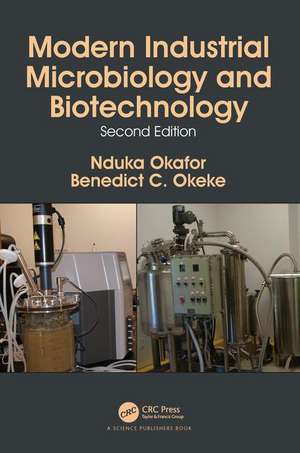Modern Industrial Microbiology and Biotechnology
Autor Nduka Okafor, Benedict C. Okekeen Limba Engleză Hardback – 4 dec 2017
| Toate formatele și edițiile | Preț | Express |
|---|---|---|
| Paperback (1) | 753.68 lei 6-8 săpt. | |
| CRC Press – 31 mar 2021 | 753.68 lei 6-8 săpt. | |
| Hardback (1) | 1103.57 lei 6-8 săpt. | |
| CRC Press – 4 dec 2017 | 1103.57 lei 6-8 săpt. |
Preț: 1103.57 lei
Preț vechi: 1482.73 lei
-26% Nou
Puncte Express: 1655
Preț estimativ în valută:
211.17€ • 220.93$ • 175.42£
211.17€ • 220.93$ • 175.42£
Carte tipărită la comandă
Livrare economică 02-16 aprilie
Preluare comenzi: 021 569.72.76
Specificații
ISBN-13: 9781138550186
ISBN-10: 1138550183
Pagini: 488
Ilustrații: 8; 58 Tables, black and white; 3 Illustrations, color; 84 Illustrations, black and white
Dimensiuni: 178 x 254 x 35 mm
Greutate: 0.75 kg
Ediția:2 New edition
Editura: CRC Press
Colecția CRC Press
ISBN-10: 1138550183
Pagini: 488
Ilustrații: 8; 58 Tables, black and white; 3 Illustrations, color; 84 Illustrations, black and white
Dimensiuni: 178 x 254 x 35 mm
Greutate: 0.75 kg
Ediția:2 New edition
Editura: CRC Press
Colecția CRC Press
Cuprins
Introduction. Introduction of Industrial Microbiology and Biotechnology. Biological basis of productivity in industrial microbiology and biotechnology. Microorganisms in Industrial Microbiology and Biotechnology. Molecular Biology and Bioinformatics in Industrial Microbiology and Biotechnology. Nutrient Media for Cultivation of Industrial Microorganisms and Production of Microbial Products. Biosynthetic Pathways for Metabolic Products of Microorganisms. Processes for Overproduction of Microbial Metabolites for Industrial Applications. Selection and Improvement of Industrial Organisms for Biotechnological Applications. Methods of Preservation of the Gene Pool in Industrial Organisms and Culture Collections. Basic operations in industrial fermentation. Fermentors and Operation of Fermentation Equipment. Downstream Processing: Extraction of Fermentation Products. Significance and Processes of Sterility in Industrial Microbiology. Production of metabolites as bulk chemicals or as inputs in other processes. Biocatalysts, Immobilized Enzymes and Immobilized Cells. Production of Biofuel and Industrial Alcohol. Production of Organic Acids. Production of Amino Acids by Fermentation. Mining Microbiology: Bioleaching by Microorganisms. Use of whole cells for food related purposes. Single Cell Protein Production. Yeast Production. Production of Microbial Insecticides. Production of Rhizobium Biofertilizer. Production of Fermented Foods. Alcohol-based fermentation industries. Production of Beer: Raw Materials and Brewing Processes. Production of Wines and Spirits. Production of Vinegar. Production of commodities of medical importance. Production of Antibiotics and Anti-Tumor Agents. Production of Ergot Alkaloids. Microbial Transformation of Steroids and Sterols. Vaccines. Drug Discovery in Microbial Metabolites: The Search for Microbial Products with Bioactive Properties. Waste disposal. Treatment of Wastes in Industry.
Descriere
The industrial microbiology field involves thorough knowledge of the microbial physiology behind the processes. Various industrial microbiology applications are covered broadly, emphasizing the physiological and genomic principles behind them. New elements such as bioinformatics, genomics, proteomics, site-directed mutation and more are discussed.
Notă biografică
Nduka Okafor holds a bachelor’s degree from the University of London, England and a PhD from the University of Cambridge, England. He has taught and/or researched in Australia, Austria, the Netherlands, England and the USA. In the USA he has been at the University of Wisconsin, Madison, WI; Cornell University, Ithaca, NY; Furman University, Greenville, SC; the University of Northern Iowa, Cedar Falls, IA and Clemson University, SC. He has acted as external examiner (graduate and undergraduate) at the University of Zimbabwe, the University of Addis Ababa, Ethiopia, the University of Poona, India and the University of New South Wales, Australia. His books include Modern Industrial Microbiology and Biotechnology (Science Publishers, Enfield, NH, USA), and Environmental Microbiology of Waste and Aquatic Systems (Springer, Dordrecht, the Netherlands).
Benedict C. Okeke is a Professor in the Department of Biology, Auburn University at Montgomery (AUM); where he is also a Distinguished Research Professor, Ida Belle Young Endowed Professor, Alumni Professor and the founding Director of the Bioprocessing and Biofuel Research Lab (BBRL). At AUM he received superior performance evaluations in all areas: research, teaching and service. Prof. Okeke received MS and PhD degrees from the University of Strathclyde, Glasgow, Scotland. He currently teaches industrial microbiology, environmental microbiology, special topics in biotechnology, general microbiology, and directed research. He has been an external examiner for numerous PhD students internationally. Professor Okeke did postdoctoral work at the University of California, Riverside; Gifu University, Japan; and the International Center for Genetic Engineering and Biotechnology, Trieste, Italy. He has 60 technical research papers in peer reviewed journals, three US patents, numerous conference abstracts and research grants from different organizations. He served as an Associate Editor for Journal of Environmental Quality and in the editorial board of Applied Biochemistry and Biotechnology. Prof. Okeke is a member of the Society for Industrial Microbiology and Biotechnology, American Society for Microbiology, Phi Kappa Phi, Sigma Xi and the Alabama Academy of Science.
